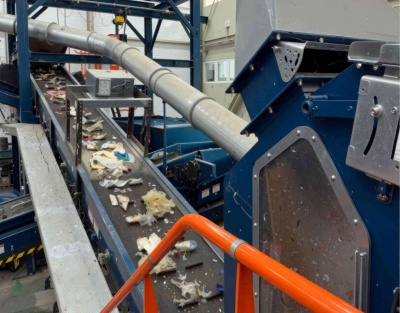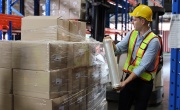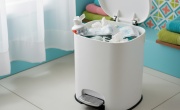Bio-based plastic sorting trial demonstrates recycling breakthrough
PROSPER project trial in the Netherlands successfully demonstrates that contaminated bio-based plastic packaging can be identified and separated from municipal waste streams using advanced NIR optical sorting technology.
 A sorting trial conducted by applied research organisation NTCP in the Netherlands has successfully demonstrated that bio-based plastics can be identified and separated from conventional plastic waste streams, addressing a significant infrastructure challenge for the growing bio-based packaging sector.
A sorting trial conducted by applied research organisation NTCP in the Netherlands has successfully demonstrated that bio-based plastics can be identified and separated from conventional plastic waste streams, addressing a significant infrastructure challenge for the growing bio-based packaging sector.
The PROSPER project trial processed four tonnes of municipal lightweight packaging waste spiked with bio-based plastic packaging at NTCP's advanced sorting facility, separating both film and rigid forms of bio-based plastics including PLA from Futerro and starch blends and biopolyesters from Biotec.
Material recovery facilities currently rely primarily on near-infrared sensors to identify and separate different plastic types, but most systems cannot recognise bio-based plastics such as PLA, starch blends or biopolyesters. When bio-based materials are incorrectly sorted into conventional recycling streams, contamination occurs, reducing the quality of recycled material.
The trial addresses growing concern over infrastructure compatibility as bio-based plastic production capacity is set to increase significantly from 2.47 million tonnes in 2024 to approximately 5.73 million tonnes by 2029 globally. European biodegradable plastic market revenue reached €2.02 billion in 2024 and is predicted to reach €8.51 billion by 2034.
Real-world sorting conditions tested
The NTCP trial was designed to replicate typical waste processing conditions by mixing clean bio-based packaging with actual municipal lightweight packaging waste at a material recovery facility before transfer to NTCP for sorting. This ‘contamination step’ was important to make bio-based packaging for sorting comparable to how it would appear in a real world scenario.
Research has shown that while NIR spectroscopy can detect PLA's distinct spectrum in laboratory conditions, sorting performance depends heavily on contamination levels and appropriate backlighting settings for transparent materials.
The trial created separate streams of bio-based plastics suitable for downstream mechanical and chemical recycling, with materials sorted to enable processing without contaminating conventional plastic streams. This builds on previous research confirming that PLA emits a unique polymeric signature that can be programmed for identification by NIR systems.
Research has highlighted that current NIR sorting infrastructure faces limitations beyond bio-based plastics, with systems struggling to achieve the 96 per cent plastic purity required by industry, typically delivering 75-95 per cent purity with conventional technology.
Infrastructure adaptation requirements
The successful NTCP trial demonstrates technical feasibility, but scaling requires higher volumes of bio-based plastics entering waste streams.
Current infrastructure challenges mirror those faced by other compostable materials. Compostable coffee cups made with PLA linings are rejected by specialist recycling facilities because PLA contaminates conventional plastic output streams, highlighting the need for separate processing pathways.
The European Commission has set substantive circularity objectives including 50 per cent recycling of plastic packaging by 2025 and 55 per cent by 2030, with maximum 10 per cent landfilling of municipal waste by 2035. These targets require compatible infrastructure for both conventional and bio-based materials.
PROSPER project researchers plan next phases focusing on improving NIR and vision classification accuracy, pretreatment washing to prepare sorted bio-based plastics for recycling, and developing mechanical and chemical recycling processes specifically for bio-based plastic materials from waste streams.



